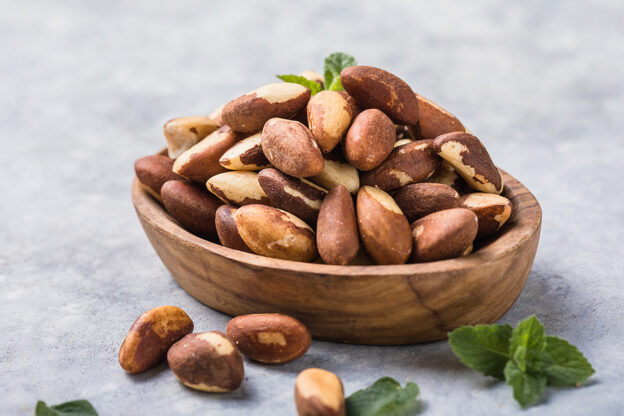By David Blyweiss, M.D., Advanced Natural Wellness
November 17, 2021
I like to eat two Brazil nuts every day.
That may sound random, but there’s a reason I limit myself to two. It’s because Brazil nuts are an extremely high source of selenium, a powerful antioxidant. A single nut contains between 68 and 91 mcg of this mineral.
The recommended daily allowance for selenium is 55 mcg for us folks who are over the age of 50. But I find that RDA’s typically run on the low end. So by eating two Brazil nuts each day, I feel I’m getting optimal levels of selenium – not too little, and not too much.
Selenium is a marvelous mineral for energy, increased metabolism, weight loss, the prostate and warding off infections. But I think more people are deficient in it than we realize. And it has some very important functions in your body.
It’s critical for making thyroid hormone. Without enough selenium, the thyroid can’t do its job. Your metabolism slows down and, when that happens, it leads to weight gain. Excess calories end up being stored as fat instead of burned off as energy.
Open your arteries, improve blood flow for a new health miracle...
Did you know your circulatory system has over 60,000 miles of arteries, veins and other blood vessels, if stretched end to end?
But as you age, your blood vessels undergo changes, which may cause them to stiffen, thicken and get clogged.
GOOD NEWS! Doctors have now identified a “Miracle Molecule” inside your arteries that helps OPEN your arteries and IMPROVE blood flow.
It’s what Dr. Valentin Fuster calls it, "One of the most important discoveries in the history of cardiovascular medicine."To you, that means...
- Healthy blood pressure
- Sharper mind and memory
- Skyrocketing energy and muscular strength
- Increased pleasure and passion in the bedroom
- Improved circulation to every cell and organ in your body
Go here to discover a new natural way to significantly boost the levels of this miracle molecule in YOUR body NOW!
So people who are lower in selenium will automatically have a lower metabolic rate and aren’t going to burn fat as easily.
That’s why you often see selenium touted as a weight loss supplement. If you’ve got a sluggish thyroid, selenium helps it produce thyroid hormones that can help bring your metabolism back up to par and burning fat again.
This works especially well if you combine a calorie restricted diet with at least 200 mcg of selenium a day. This has shown to help people lose weight much better than if they do one or the other. They work in synergy with one another for optimal results.
But your thyroid and metabolism aren’t the only things selenium is good for.
Protect Your Prostate and Ward off Viruses
In men, selenium appears to help protect against the development of prostate cancer – and on prostate cancer’s ability to progress to advanced stages.
This is great news for us men as we age. We already know that most men die with prostate cancer, but not of prostate cancer. Getting more selenium, along with other prostate friendly nutrients, can help ensure you can reach that outcome.
Are You Suffering From...
- Love handles and a pot belly
- Romance that isn't what it used to
- Forgetfulness and inattention
- Low (or no) strength and endurance
- A sex drive that's shifted into neutral...or worse
If so...you may have Mature Male Burnout. Click here to discover more about this unique condition and what you can do about it.
Selenium may also help reduce the risk of other cancers, such as colorectal, lung, bladder, skin, esophageal, and gastric cancers.
And here’s something that’s extremely important in today’s world.
Selenium plays a key role in strengthening immunity, reducing oxidative stress and fighting inflammation.
People who don’t have enough selenium are more susceptible to viral infections. They also have more severe symptoms and outcomes.
So getting enough selenium can help protect against – or reduce symptoms of – viral infections that might otherwise set up house in your body.
How To Find Out if You are Low in Selenium
Even though selenium is essential for good health, getting too much can be dangerous. But unless you’re gorging yourself with Brazil nuts, it’s unlikely you will get too much from your diet.
So if you’re feeling sluggish or maybe you catch viruses more than those around you, it’s a good idea to get tested. You might need a little more selenium than you’re getting from the foods you eat, and you want to make sure the dosage is correct.
Just ask your doctor to order a “selenium red blood cell test.” LabCorp, Quest or another diagnostic center can process the blood sample and get the results in a matter of days.
And by the way…
Even though selenium levels are one of the easiest things to check, thyroid tests don’t automatically include it. So don’t expect to get your selenium levels checked during a thyroid exam. You’ll have to ask for it.
SOURCES:
Ventura M, Melo M, Carrilho F. Selenium and Thyroid Disease: From Pathophysiology to Treatment. Int J Endocrinol. 2017;2017:1297658.
Cavedon E, Manso J, Negro I, et al. Selenium Supplementation, Body Mass Composition, and Leptin Levels in Patients with Obesity on a Balanced Mildly Hypocaloric Diet: A Pilot Study. Int J Endocrinol. 2020;2020:4802739.
Li Y, Clark C, Abdulazeeme HM, et al. The effect of Brazil nuts on selenium levels, Glutathione peroxidase, and thyroid hormones: A systematic review and meta-analysis of randomized controlled trials. J. King Saud Univ. Sci. 2020;32(3):1845-1852.
Sayehmiri K, Azami M, Mohammadi Y, Soleymani A, Tardeh Z. The association between Selenium and Prostate Cancer: a Systematic Review and Meta-Analysis. Asian Pac J Cancer Prev. 2018;19(6):1431-1437.
Selenium Fact Sheet for Professionals. National Institutes of Health. Last Updated Mar 2021.
Khatiwada S., Subedi A. A Mechanistic Link Between Selenium and Coronavirus Disease 2019 (COVID-19). Curr Nutr Rep. 2021;10: 125–136.
Hiffler L, Rakotoambinina B. Selenium and RNA Virus Interactions: Potential Implications for SARS-CoV-2 Infection (COVID-19). Frontiers in Nutrition. 2020;7:164.







